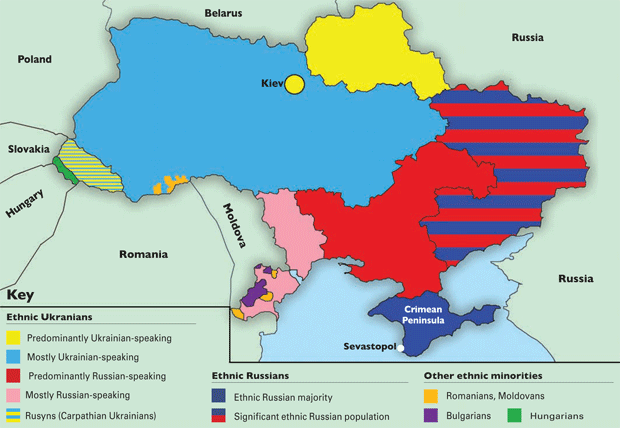West 'must act' as Putin plots next move
Western leaders are mulling over how best to tackle the threat of a resurgent Russia. Emily Hohler reports.

Get the latest financial news, insights and expert analysis from our award-winning MoneyWeek team, to help you understand what really matters when it comes to your finances.
You are now subscribed
Your newsletter sign-up was successful
Want to add more newsletters?

Twice daily
MoneyWeek
Get the latest financial news, insights and expert analysis from our award-winning MoneyWeek team, to help you understand what really matters when it comes to your finances.

Four times a week
Look After My Bills
Sign up to our free money-saving newsletter, filled with the latest news and expert advice to help you find the best tips and deals for managing your bills. Start saving today!
The Ukrainian peninsula of Crimea (see map below) lies at the heart of a region that has always been hugely strategic, notes Liam Halligan in The Daily Telegraph. With Russia tightening its grip on Crimea following the toppling of Ukraine's pro-Russian president, Viktor Yanukovych, the "economic and political stakes" remain "sky-high".
The West fears a "resurgent" Russia and there are anxieties about western European energy security and the "systemic fall-out if a near-bankrupt Ukraine defaults on its sovereign debt".
Russia supplies more than a third of western Europe's gas and many powerful Western firms are heavily committed in Russia. This will "seriously complicate" any attempt at economic sanctions.
MoneyWeek
Subscribe to MoneyWeek today and get your first six magazine issues absolutely FREE

Sign up to Money Morning
Don't miss the latest investment and personal finances news, market analysis, plus money-saving tips with our free twice-daily newsletter
Don't miss the latest investment and personal finances news, market analysis, plus money-saving tips with our free twice-daily newsletter
In short, "Moscow has its thumb on our economic throat". It also has fiscal strength on its side. Government debt is the lowest of any major economy. Moscow has currency reserves of $450bn, so it "holds most of the cards" when it comes to rescuing Ukraine financially at a time when "little Western cash has emerged". When it comes to "statecraft and diplomacy, money talks".
That doesn't mean we shouldn't act, says the Financial Times. EU leaders must draft a "series of escalating measures against Moscow" including sanctions, even if they could undermine our business interests.
They may be a "blunt tool", but "sceptics need only look at their success in bringing Iran back to the negotiating table to be reminded of their usefulness". As Putin "ponders his next move he must know that he faces a strong and united EU".
This is vital, agrees Malcolm Rifkind in The Guardian. If Western reaction is limited to "rhetorical protest and a few symbolic gestures like the boycott of the G8 meeting", this will embolden Putin. Eventually we will see "aggressive action against the Baltic states, further denial of Georgia's territorial integrity, and pressure to separate eastern Ukraine from the rest of that country".
Putin is not Hitler. But the fact remains that "the last time the alleged need to protect ethnic brethren was used as a justification for invasion and annexation in Europe was the Sudetenland, and the shame of the Munich Agreement in 1938". Since he came to power, Putin's aim has been to reassert control over Russia's "near abroad".
It would help if Arseniy Yatsenyuk, interim prime minister of Ukraine, gave Moscow an explicit, public reassurance that Russia's lease on the Sevastopol naval base will be honoured and that it will chart an orderly course to the "greater autonomy that will almost certainly have to follow a Crimean referendum", says The Times.
The Kremlin propaganda machine is milking the idea that Russians are at risk. Even as he appeared ready to de-escalate', Putin spoke of Russia being involved in a "humanitarian" mission on behalf of Russians at risk of "annihilation and torture".

Get the latest financial news, insights and expert analysis from our award-winning MoneyWeek team, to help you understand what really matters when it comes to your finances.

Emily has worked as a journalist for more than thirty years and was formerly Assistant Editor of MoneyWeek, which she helped launch in 2000. Prior to this, she was Deputy Features Editor of The Times and a Commissioning Editor for The Independent on Sunday and The Daily Telegraph. She has written for most of the national newspapers including The Times, the Daily and Sunday Telegraph, The Evening Standard and The Daily Mail, She interviewed celebrities weekly for The Sunday Telegraph and wrote a regular column for The Evening Standard. As Political Editor of MoneyWeek, Emily has covered subjects from Brexit to the Gaza war.
Aside from her writing, Emily trained as Nutritional Therapist following her son's diagnosis with Type 1 diabetes in 2011 and now works as a practitioner for Nature Doc, offering one-to-one consultations and running workshops in Oxfordshire.
-
 Should you buy an active ETF?
Should you buy an active ETF?ETFs are often mischaracterised as passive products, but they can be a convenient way to add active management to your portfolio
-
 Power up your pension before 5 April – easy ways to save before the tax year end
Power up your pension before 5 April – easy ways to save before the tax year endWith the end of the tax year looming, pension savers currently have a window to review and maximise what’s going into their retirement funds – we look at how